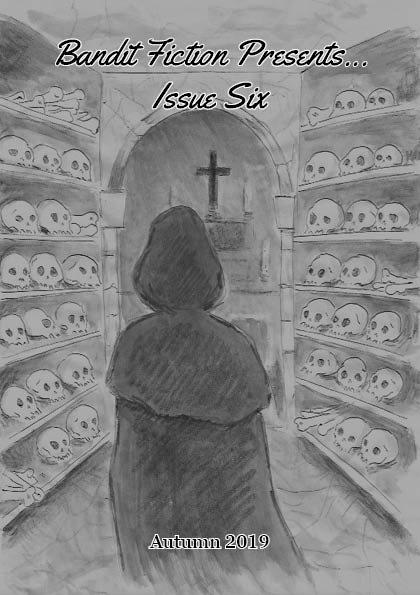
Gerald sat staring at his computer screen – the lines of decimal pointed numbers assumed a blurred mass. He leaned back in his chair and rubbed his eyes. How long had he been doing this now? Reviewing risk: making assessments of the chances of one thing happening counterbalanced by another thing happening. He diminished the work screen and clicked on his private email address; the email account Martha knew nothing about. She still had not replied to his first email – sent over five days ago. It had read:
Hi Melissa, Gerry here (she would have known that from the email address but he didn’t know what else to say) just wondered how you’re doing? How you keeping in the lockdown? (smiley face emoji). Can’t wait to hook up when this is all over (sounding casual, like it’s no big deal, just sex, followed by a double thumbs up and another smiley face emoji). Miss you, (sad face emoji), love you (heart emoji).
Why was he always waiting for something to happen? He seemed to live in perpetual state of purgatory. Waiting and waiting. He felt as if he’d spent his entire life standing at the bus stop and the bus had never shown up.
Gerald didn’t like working at home. He found it hard to concentrate. He’d much rather be in the office. It was the whole routine he liked. It gave him a focus. He was someone. He was Gerald R. Scott, Actuary for the Ask Us Insurance Company. At home he was just Gerald or Gerry. He liked going to work, if not the actual job itself. Getting up at 6am, when the alarm buzzed; shaving; dabbing on moisturiser (well, he was a modern man) and good quality aftershave; getting dressed in one of his smart shirts and suits; catching the subway; reading a book as the carriage jolted between stops. He liked it all. And he missed it. Gerald was an avid reader – R. Chandler, R. Carver, F. Scott Fitzgerald, J. Steinbeck or, for a real good laugh no one could better D. Runyon – he liked the American classics. He liked to ‘lose himself’ in a good book.
Then he’d get off the train and walk the two blocks to the Starbucks, say a cheery “Hi – how you doing?” to the Puerto Rican guy who sold him his coffee every morning which he’d then cling on to like it was some prop in some amateur dramatic slap-stick performance until he reached his desk on the tenth floor of the Edgar Groover building. Yes, he liked all that. He liked the banter in the office. The chat about last night’s soccer or baseball game or the latest tweets from Trump.
He’d sit at his desk and look at figures, calculate risk and loss and send them through to Dixon to finalise the cost of the risk and then prepare a quote for the client (life and property mainly). Then it’d be lunchtime. He liked to read at lunchtime too. He’d go to the cafeteria and collect his food on a plastic tray – normally a salad or a pasta dish with a soft drink and some fruit on the side – and then he’d sit at a spare table (or on a stool on the side bar if available which would ensure he wasn’t disturbed). Then he’d read… and read. The refectory was open to all company employees in the Edgar Groover Building and not just those who worked for Ask Us Insurance, so he could be anonymous most of the time. Nowadays the only things people seemed to ‘read’, Gerald considered, were their cell phones. Constantly looking at them as if they were babies who required continuous attention and feeding: failing that they were listening to music through giant headphones which blotted out the surroundings. Newspapers were so last century, and books too – well, books seemed to be the century before that, but Gerald liked books. He liked something solid in his hands, he liked paper. He’d grown up with it: at school, in the office, in the home. Paper was king. Gerald was a paper guy.
But now some virus had come along and that had meant he had to stay home. For how long he didn’t know. Of course, the virus had not appeared in any of his calculations of risk – it hadn’t appeared in anyone’s as far as he could tell. No one had seen it coming, though it wasn’t a total surprise that it had happened. It was a bit like nuclear war, it had lurked in the background of humanity for so long that people had become careless, thoughtless, forgetful. Then again, the 2008 crash had caught Wall Street traders with their pants down. Man, had they panicked when that pile of shit had hit the fan! The truth was that no one had predicted anything with any degree of accuracy ever, that was about the size of it. It seemed somewhat ironic, Gerald reflected, that Governments around the globe, spent billions of dollars on ‘defence’ but then, when they came under attack by some pre-historic microbe, they had no answer to it, whilst missiles, with nuclear warheads, sat in silos: isolated, unloved, unused, useless.
Gerald took his burner phone out of his desk drawer. ‘Burner’ phones, which had once just been popular with terrorists and drug dealers, were now used by anyone up to anything nefarious. He flicked it open and looked at the text messages. Still nothing from Melissa. Silence. Was she ill? Caught up in the pandemic? Fighting to breath in some hospital somewhere? Gerald didn’t think so. He’d seen her seven or eight days ago and she’d seemed fine then. Anyway, he had always had the feeling that she didn’t go out that much. And a text, surely, she would have texted him if she had been going down with something, but nothing.
He closed the phone and spun it around on his desk. He imagined it was a roulette wheel and a little white ball was trickling into its edge. It would fall on a colour: red, twelve and he would win. Should he phone her or not? Martha was downstairs, typing away on her laptop, doing accounts. Lockdown meant nothing to her, she often worked at home and, when the children had been young, being an accountant had been an ideal job. It had been easy to do company audits at home and now she liked it, preferred it to going into the office, which she described as a ‘drag’. Theirs had been a perfect match: she an accountant, he an actuary for an insurance company. Ask Us and say “I do”.
Phoning Melissa was a risk, but was it a risk worth taking? He prodded the phone again, and when it stopped its slow, ponderous spin, he flicked it again and again as if he were giving the roulette wheel one last chance to decide for him.
Gerald didn’t think of himself as a risk taker. He took calculated gambles. But when he considered them in the round, they had – although not landing him in trouble exactly – mainly failed, or at least failed to live up to his expectations. It was like horse racing. He didn’t bet much; he had liked to go to the meetings at Aqueduct before he had married. Martha hated gambling saying it was a ‘waste of money’, but to him it was a calculated risk. Maybe he ran a 25% to 30% strike rate, but, overall, the bookies took the edge and he lost. Not a lot but enough. He’d once done well on each of the three winners of the Triple Crown, but that was the best he’d ever managed – one sizable win. That was the peak of his gambling career, but now all the money was back with the bookies, with interest.
His stocks had tanked too, thanks to Coronavirus and the Credit Crunch. 80% of his and Martha’s shares portfolio had failed to raise their expected dividends. What they had made had just about paid for Hope and Dave to go through college but there didn’t seem a lot left for his and Martha’s (or his and Melissa’s) retirement. But then he’d not anticipated that Martha would need cancer treatment, which the medical insurance policy had failed to cover in full (treatment in hospital and meds, but nothing for loss of earnings and carers visits during the three months of recuperation).
This post is brought to you by The Book of Jakarta
Despite being the world’s fourth largest nation – made up of over 17,000 islands – very little of Indonesian history and contemporary politics are known to outsiders. From feudal states and sultanates to a Cold War killing field and a now struggling, flawed democracy – the country’s political history, as well as its literature, defies easy explanation. Like Indonesia itself, the capital city Jakarta is a multiplicity; irreducible, unpredictable and full of surprises. Traversing the different neighbourhoods and districts, the stories gathered here attempt to capture the essence of contemporary Jakarta and its writing, as well as the ever-changing landscape of the fastest-sinking city in the world.

He had had dreams once. When he’d left Yale (it wasn’t actually Yale but that’s what he’d told everyone after he’d written it on his resume) he’d wanted a successful career. He’d wanted to be someone. What was the line Brando had used when he had played the boxer Terry Malloy in On the Waterfront? ‘I coulda had class. I coulda been a contender. I coulda been somebody.’ Or something like that. That was how Gerald felt. He could have been somebody. He had had dreams. Ambitions. But they had all been swept away by the waves of life, reality washing and lapping at the flaky dreamy sand of time until there was nothing left. Nothing at all. Now he just wanted to get over the finishing line: retire, buy a large house in the mountains where he could go fishing and the children could visit with their families if they ever got around to starting them. That would mean Dave would have to kick his weed habit and Hope would need to put her career on hold for a while. Yes, that’s what he thought of now. Retirement. He was fifty-seven, Martha was two years younger but, then again, sometimes when he thought of retirement, he thought of Melissa wearing a golden evening dress and standing on the deck of a cruise ship, her long, auburn hair blowing in the breeze, clutching a black hand bag to her side whilst the bright yellow sun loomed as large as a peacock’s fan tail as it set behind her. He imagined the waiter slapping him on the shoulder and saying, as he served them chilled cocktails, “Hey Gerry, my man, you really struck lucky in the lottery of life, an attractive and glamourous younger woman, money in the bank, and a third of your life ahead of you. Stay lucky my friend.” But if she wouldn’t return his calls, his texts, his emails – then the cruise liner dream was going to sail away into the distance without him on board.
Gerald enlarged the actuary folder on the computer screen and looked at the figures again. Why were figures so boring? Why couldn’t figures be interesting? Martha loved them. He couldn’t see why. To Gerald numbers were meaningless – he’d spent his whole life working with couldn’t-give-a-fuck figures and what had he got out of it? Fuck all. That’s what. No, Gerald was a words man. He loved literature. Always had. He didn’t want to be an actuary. He’d fallen into it. It had offered a ‘competitive salary package’. It was something his dad had wanted him to do. A safe, secure job with no risk attached and the first company he’d worked for had fallen for his embellished resume without doing in-depth background checks.
“The world will always need insurance actuaries,” his father had said when he had gotten the job, as if it were important, as if there would be hordes of people in the street chanting ‘we want insurance actuaries’ if the job were ever to be abolished.
Mind you, algorithms had changed the profession completely, now he just had to input data and see what emerged from the computer whereas when he had started out, he had spent onerous hours studying books of logarithmic type figures.
His dad had worked in the insurance game too, knew what it entailed. To Gerald it was just a stop gap until he formulated his ideas, his plans, his dreams – that had been thirty-five long years ago and he still had no idea what he wanted from life. What he wanted to be. No idea at all.
To compensate, his life had become a tissue of lies and fantasies. He told stories – painted himself as a hero or downtrodden victim however the mood took him – it made up for the dull reality. He’d had other affairs before Melissa, of course. She was just another calculated risk. Gerald had gotten away with affairs before, why not one more? Martha, when she went to the office, often worked late (as she didn’t go into the office that often she figured she would ‘make the most of it’). Sometimes, if she was undertaking a company audit, she’d have to fly to different states – particularly down South – and visit companies, spend nights away in hotels. It was easy for Gerry to ‘play away’ and he’d never been caught. Not even a whiff. That was another reason why he liked going into the office – it meant he could see Melissa. He’d not worked ‘love’ into the equation, that had taken him by surprise. He’d really fallen for her, big style. He was not really sure what she did but she was usually available when he wanted to see her: they would go to the theatre or for a meal and wind up back at her cosy, well-furnished apartment. She always took an interest in him, she laughed at his jokes and said the right, sympathetic words when he was feeling down. Even during his post-coital ramblings, Melissa would listen attentively and make constructive comments: unlike Martha who, in bed, was just a bundle of duvet, not interested in what he said or did. Martha would read her book; he would read his. They would go to sleep.
Maybe Melissa was a professional mistress, Gerald considered. The truth was he didn’t know. Although she was clearly a lot younger than him, he didn’t know her age, or what she did for a living, or where she came from. When he thought about it, he actually didn’t know much about her at all. She never gave much away, never said much about herself – she liked to be mysterious. Maybe he should have listened more. Maybe he talked too much, telling her about his life, what had happened in the office, his time with Martha, his gripes about the kids. “Dave got busted for selling dope again,” he’d say.
Melissa was sympathetic as she had been when one of the brokers, Christina, had left. She had said, in her farewell speech, that if Gerald told her that it was raining, she would walk to the window to check it out. That had hurt Gerald. Hurt him real bad. His colleagues had tittered with laughter as if Christina was saying what they were all thinking – Gerald was a fantasist and a liar. He had told so many lies over the years he didn’t know what was truth and what was fiction. Sometimes he liked to embellish, tell a good story, what was wrong with that? It was what made the word go around.
Melissa had said, “maybe she was jealous because you didn’t fuck her.”
Gerald had laughed. He had liked that, the idea that perhaps Christina’s ‘joke’ had been motivated by some sort of sexual jealousy. But he knew, in his heart, that it wasn’t true. She didn’t like him and more to the point, she didn’t trust him.
Why did looking at rows of numbers give Gerald suicidal thoughts? It had started out as a daydream, but it was a reverie that had grown stronger and stronger over the years, and now, he was making plans. Didn’t they say that it was a clear sign that someone was intending to commit suicide? When they made plans? When he wasn’t thinking about retirement with Martha or Melissa (no chance of that if she won’t return my calls or emails or texts – Gerald thought again) then his mind would turn to suicide. He actually found thinking about ending his life quite relaxing, calming, almost therapeutic. It was like the ultimate fantasy but, of course, you could never imagine yourself dead, you always saw your own funeral, the coffin being carried into the church and lowered into the grave. People crying, ‘oh why Gerry, why did it have to be you?’
But in reality, it would probably be like Ray Chandler’s funeral – just seventeen people around a grave in Mount Hope, San Diego – or wherever it was. What was it that English poet, Larkin, had said about funerals? It doesn’t matter what you do in your life the number of people who attend your funeral will depend on the weather, or words to that effect. Gerald couldn’t remember the quote exactly, but hey, why did it matter if he couldn’t remember? He could make it up, couldn’t he? It was what he always did.
He knew his life insurance policy wouldn’t pay out on suicide and, anyway he wouldn’t want his family to carry the stigma, so he would have to make it look like an accident. He’d mulled over different types of misadventure and the best he could think of was driving at literally breakneck speed into a tree. He had even found a suitable solid and robust tree nearing the end of a very straight part of the freeway. Other ideas were: slipping under the water whilst having a bath; falling off a cliff due to the path giving way as a result of costal erosion; falling off a ladder whilst cutting off some tree branches or doing some household repairs – but Gerald normally paid for someone to do manual jobs – or, another one he particularly liked, having mushroom soup for lunch when he was working at home, and adding some poisonous mushrooms he’d picked in the woods (but Gerald didn’t know a toadstool from a barstool). Anyway, if he were going to do it properly, he would have to be sure he died. There would be nothing worse than a suicide attempt that went wrong and left him badly injured. No, it would have to work. He liked the idea that he would be getting one over on his insurance company and that, in death, he would be committing insurance fraud so that Martha would get a full pay out (or Melissa, or even both if he amended his will accordingly, what would it matter if they knew about each other after his demise?). It would keep them both comfortably off for the rest of their lives – that would be good.
But Melissa wasn’t replying to any of his communications. Finally, he decided to make that call on the burner phone. As he half expected it went straight through to voicemail. Hi, this is Melissa, I am sorry I am not here right now to take your call, please leave a message after the tone.
Gerald didn’t speak, instead he deleted all the number history and text messages and threw the burner phone into the waste paper basket. It had been more than five days now and still no replies to his daily missives. It was over. Finished. Melissa had moved on.
Martha entered the bedroom, which Gerald used as his office when he worked at home. She preferred being downstairs with the laptop, the television, the cats. He turned in his seat to greet her. She approached.
“I made you a coffee,” she said placing it on the desk beside Gerald – his computer showed the same page of figures it had depicted for the past two and a half hours.
“Thanks,” Gerald said.
“What’s that in the bin?” Martha asked.
“Oh nothing, a burner phone. Some guy in the office was having an affair but she finished it and he gave me the phone – just as a spare – I thought mine had broken – you remember when you couldn’t get hold of me a week or so ago? My phone had turned itself off? But I decided I didn’t want it.”
Martha fished the phone out of the bin, looked at it. “There’s no numbers in it.”
“No,” Gerald said, “he cleaned it before he gave it to me.”
“That’s devious, using another phone – I hope his wife catches him out. I wonder why they do it?”
“It’s the way some guys are,” Gerald said. “They like to take chances, risks.”
“There’s enough risk in life without taking any more,” Martha mused.
“You’re telling me there are. Take this coronavirus – no one saw that one coming,”
“No, that’s for sure.” Martha carefully placed the phone back in the bin. “Anyway, how are you getting on?”
“Not well, not well at all,” he said. “All these figures… well, I’ve had enough to be honest.”
About The Author
Colin was born in Croydon in 1964 at the height of Beetlemania and now lives in Hertfordshire with his wife. He has done a variety of paid employment ranging from administrator, motocycle dispatch rider, gas salesman, trainer and truancy officer – during which time he has lived in Slough, Stoke-on-Trent and Middlesbrough; currently he works in education. Creative writing has always been a passion of his and he has been frantically scribbling away since his early twenties. he has written a number of novels, articles, short stories, plays, and poems and has been fortunate enough to have had a few pieces published, including a number in Best of British Magazine (the latest being Oct. 2020). Colin wrote Lockdown Tuesday during Easter 2020, at the height of the UK lockdown, and views it as the best short story he has ever written, which may (or may not) say something about his previous efforts!
Bandit Fiction is an entirely not-for-profit organisation ran by passionate volunteers. We do our best to keep costs low, but we rely on the support of our readers and followers to be able to do what we do. The best way to support us is by purchasing one of our back issues. All issues are ‘pay what you want’, and all money goes directly towards paying operational costs.






















Leave a reply to colscolumn21 Cancel reply